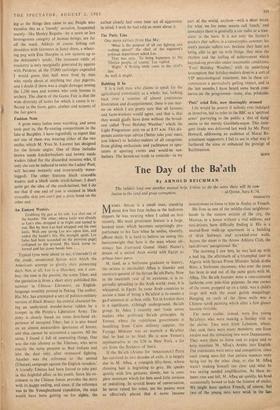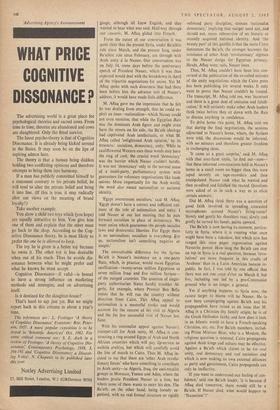The Day of the Ba'ath
By ARNOLD BEICHMAN The infidels lend one another mutual help. Unless ye do the same there Will be con-
fusion in the land and great corruption. —al-Quran, Sura 8:74.
DAMASCUS
MICHEL AFLAQ is a small man, standing about five feet four inches in the bedroom slippers he was wearing when I called on him recently. His most prominent feature is a large, hooked nose, which becomes surprisingly pro- portionate to his face when he smiles, absently, alibost shyly. It is hard to believe on seeing this bantamweight that here is the man whose ob- stinacy has frustrated Gamal Abdel Nasser's dream of a united Arab world with Egypt as primus inter pares.
M. (and, as a Sorbonne graduate in history, ' the nesiett is inevitable) Aflaq is founder and secretary-general of the Syrian Ba'ath Party. Now in the twentieth year of its existence, it is re- portedly spreading in the Arab world; even, it is whispered, in Egypt. In some Arab countries to accuse a man of being a Ba'athist is to ensure a gaol sentence or, at best, exile. Yet in Jordan there is a significant, although underground, Ba'ath group. In Aden I recently met trade union leaders who professed Ba'ath principles. In Yemen, where the republican government is benefiting from Cairo military support, the Foreign Minister was so staunch a Ba'athist that he had to be fired. He is now Yemen's representative at the UN in New York, a far cry from the fleshpots of San'a.
If the Ba'ath (Arabic for 'renaissance') Party has survived its tw o decades of exile, it is largely due to M. Aflaq, a youngish fifty-three, whose thinning hair is beginning to grey. He speaks quietly with few gestures, slowly, but in com- plete sentences which for him need little revision or redrafting. In several hours of conversation, he never raised his voice, yet his pauses were so effectively placed that it never became monotonous to listen to him in Arabic or French.
He lives in one of the middle-class neighbour- hoods in the eastern section of the city, the Mazraa, in a house without a real' address, and taxi-drivers have difficulty finding it. His is a second-floor walk-up apartment in a building of drab hallways and scrawled-over walls. Across the street is the Arrow Athletic Club, the taxi-drivers' navigational 'fix.'
The morning I saw him, he was laid. up with a bad leg, the aftermath of a triumphal tour in Algeria with Syrian Prime Minister Salah al-din Bitar, a Sorbonne classmate, who over the years has been in and out of the same gaols with M. Aflaq. The Ba'ath founder wore a rose-coloured bathrobe over pale-blue pyjamas. In one corner of the room, propped up on a table, was a child's large doll with the usual garish maquillage. Hanging on each of the three walls was a Chinese scroll painting which after a first glance became invisible.
Far more visible, indeed, were five young Ba'athists who were making a Sunday visit to the shrine. Two were from Lebanon, where, they said, there were many members; one from Jordan and the remaining two were Damascenes. They were there to listen 'and to argue and to help translate M. Aflaq's Arabic into English. The translators were noisy and competitive, since each young man felt that certain nuances were being lost by the other chap, or else M. Aflaq wasn't making himself too clear and what he was saying needed amplification. As these de- bates rose and fell, M. Aflaq sat quietly, his head occasionally bowed to hide the faintest of smiles. We might have spoken French, of course, but two of the young men were weak in the Ian- guage, although all knew English, and they wanted to hear what was said. Half-way through our causerie, M. Aflaq glided into French.
From the outset of our conversation it was quite clear that the present Syria, under Ba'athist rule since March, and the present Iraq, under Ba'athist rule since February, are through with Arab unity a la Nasser. Our conversation was on July 14, some days before the anniversary speech of President Nasser, which it was then expected would deal with the breakdown in April of the tripartite negotiations for union. Yet M. Aflaq spoke with such directness that had there been before him the advance text of Nasser's address, it would have made little difference.
M. Aflaq gave me the impression that he felt he was dealing from strength, that he *could ex- ploit an issue—nationalism—which Nasser could not even mention; that while the Egyptian Rais was the dominant Arab figure and might even have the streets on his side, the Ba'ath ideology had captivated Arab intellectuals, or what M. Aflaq called 'enlightened Arab opinion,' by its terseness: socialism, democracy, unity. While to cauliflowered Western ears these words may have the ring of cant, the crucial word 'democracy' was the barrier which Nasser couldn't hurdle. It was not `democracy' only in the normal sense of a multi-party, parliamentary system with guarantees for voluntary organisations like trade unions. More importantly for the Arab world, the word also meant nationalism or national identity.
`Egypt overstresses socialism,' said M. Mag. 'Egypt doesn't have a correct and sufficient esti- mate of the role of nationalism and unity. I told Nasser at our last meeting that he puts forwird socialism in place of democracy. We want union which guarantees the people socialist laws and democratic liberties. For Egypt there is no nationalism; socialism is everything. for us, nationalism isn't something negative or simple.'
The unresolvable difference for the Syrian Ba'ath is Nasser's insistence on a one-party State, which, in practice, would mean Egyptian satellisation—twenty-seven million Egyptians to seven million Iraqi and five million Syrians— of the merged countries. The question of single- party authoritarian States hardly troubles Al- geria, for example, where Premier Ben Bella insists that he will run the country without direction from Cairo, This Aflaq appeal to nationalism is a masterful stroke and would account for the success of his visit to Algeria and the far less successful visit of Nasser last June.
With his nationalist appeal against Nasser's trumpet-call for Arab unity, M. Aflaq is con- structing a ring around Egypt of Arab and North African countries which will pay lip-service to wahida arabiya, but which will carefully avoid the line of march to Cairo. Thus M. Aflaq in- sisted to me that there are 'other Arab revolu- tionary forces' who have something to contribute to Arab unity—in Algeria, Iraq, the anti-royalist groups in Morocco, Yemen and Aden, where the leaders praise President Nasser as a lion, but where none of them wants to enter his den. The Ba'ath, on the other hand, being loosely or- ganised, with no real formal structure or rigidly enforced party discipline, stresses 'nationalist democracy,' implying that merger need not, and should not, mean submersion of an historic or recently acquired national identity. And `the beauty part' of this gambit is that the more Cairo denounces the Ba'ath, the stronger becomes the resistance of other Arab 'revolutionary' r6gimes to the Nasser design for Egyptian primacy. Heads, Aflaq wins; tails, Nasser loses.
Thus, M. Aflaq couldn't have been less con- cerned at the publication of the so-called minutes of the unity negotiations which the Cairo press has been publishing for several weeks. It only went to prove that Nasser couldn't be trusted. The transcript, M. Aflaq told me, was incorrect and there is a great deal of omission and falsifi- cation.' It will certainly make other Arab leaders think twice before they sit down with the Rais to discuss anything in confidence.
To drive home this point, M. Aflaq told me that during the final negotiations, the sessions adjourned to Nasser's home, where, the Syrians were told, the discussions would be informal, with no minutes and therefore greater freedom in exchanging ideas.
'It came as a great surprise,' said M. Aflaq with that ever-faint smile, `to find out—now- that these informal conversations held in Nasser's home in a small room no bigger than this were taped secretly on tape-recorders and then manipulated. Nasser took what he wanted and then re-edited and falsified the record. Questions were asked of us in such a way as to elicit certain answers.'
Did M. Aflaq think there was a question of good faith involved in preading concealed microphones around Nasser's living-room? Slowly and gently his shoulders rose; slowly and gently he turned his hands, palms upward.
The Ba'ath is now having its moment, particu- larly in Syria, where it is running what once might have been a sideshow, but which now has ranged this once paper organisation against Nasserite power. How long the Ba'ath can stay on top in Syria is a real question, because 'revo- lutions' are more frequent in this cradle of `Arabism' than in a Latin American banana re- public. In fact, I was told by' one official that there was not one coup d'etat on March 8, but five, including one led by a pro-Communist general who is no longer a general.
Yet if anything happens to Syria now, the easiest target to blame will be Nasser. He is now busy campaigning against Ba'ath and his propagandists have raised as an issue that M. Aflaq is a Christian (by family origin, he is of the Greek Orthodox faith), and how does it look in an Islamic world to have a French-speaking Christian, etc. etc. For Ba'ath members, includ- ing Prime Minister Bitar, who is a Moslem, the religious question is minimal. Cairo propaganda against Arab kings and sultans may be effective. Against a Ba'ath which claims to be for real unity, real democracy and real socialism and which is now making its own external alliances as party and government, Cairo propaganda can only be ineffective.
'If you want to understand our feeling of con- fidence,' said one Ba'ath leader, 'it is because if Aflaq died tomorrow, there would still be a Ba'ath. If Nasser died, what would happen to "Nasserism"?'































 Previous page
Previous page